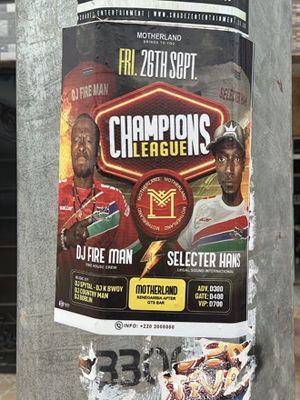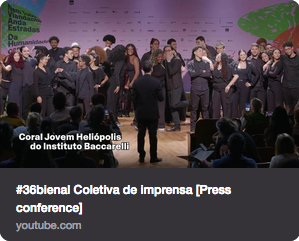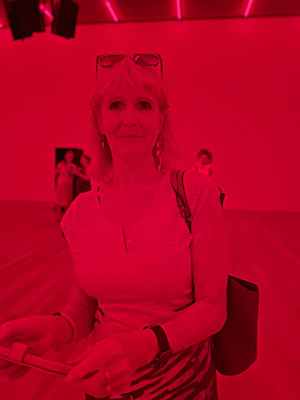Tuesday, 30
if i could, i would let life unfold on its own, leaving many things to chance. i long for the lightness that comes from surrender, from stepping aside and letting the world move in its own rhythm.
every decision carries the burden of possibility and consequence. the accumulation of which often leaves the spirit fatigued. to leave things to chance is to acknowledge the limits of control, to recognize that the world is not a machine to be manipulated but a living, unpredictable flow.
chance is not chaos; it is the whisper of life, offering paths i might never have imagined. there is a quiet poetry in uncertainty, a patience that listens rather than pushes, that waits until a choice resonates fully within me. to leave things to chance is not to abandon life, but to meet it differently—attentively, receptively, with a heart open to possibilities my mind cannot command. and in this waiting, in this yielding, i encounter myself—calm, present, attuned—ready to move when a choice feels alive, certain, and utterly my own, the moment chance and decision coincide.
Sunday, 28
we spent a wonderful weekend in town, and the highlight was definitely the party at Motherland. Selecter Hans (Legal Sound) and Fireman—two skilled DJs i know well—filled the space with music that carried everyone along. the crowd was lively, dancing together, and spread a sense of openness and belonging—a reminder of how powerful music can be in creating community.
Thursday, 25
J'aimais le désert, les vergers brûlés, les boutiques fanées, les boissons tiédies. Je me traînais dans les ruelles puantes et, les yeux fermés, je m'offrais au soleil, dieu de feu.
Le bateau ivre, 1871
Arthur Rimbaud, A Season in Hell & The Drunken Boat, 2012, p. 55, Kindle Edition (French/English)
decades later, Patti Smith led me to Rimbaud. she invokes his name constantly in her books, interviews, even on instagram. so i finally opened A Season in Hell. his writing —raw, restless, and unsettling—belongs to a different climate of the soul. i remember in my early twenties, i sought the same intensity in my writing and abstract paintings, striving for maximal expression.
Rimbaud (1854–1891) wrote in the early 1870s, following Baudelaire (1821–1867), who transformed poetry with Les Fleurs du mal, and Lautréamont (1846–1870), whose Maldoror foreshadowed surrealism. these poets broke old forms and cleared the way for modernity, later influencing symbolists and surrealists. women poets existed at the time as well, but the literary world was overwhelmingly male-dominated. their work often emphasized conventional themes—love, family, morality—and their voices were frequently confined to private circles or salons, leaving them far less visible than the men who dominated the canon.
reading Rimbaud also brings discomfort. in some passages, he uses language that is racist, a reminder that even those famous voices are shaped by their time and its prejudices. i am forced to hold two truths at once: the intensity, vision, and daring of his poetry, and the fact that parts of his worldview were offensive and narrow. this tension makes reading him more complicated, an honest encounter with both art and history.
it leaves me with an awareness of the paths that poets and artists have carved, and the courage it takes to make one's own way. it deepens my sense of what it means to push against limits in writing, in art, and in the very search for life.
Wednesday, 24
there is a friend i really like, and the relationship means so much to me that i wouldn't want to lose it. at the same time, i often hear that there isn't really time for me. weekends are completely off-limits; there seems to be no room for me there. i wondered if it meant i wasn't important enough, but i realise that it isn't necessarily about me. some people simply need a lot of time for themselves to recharge what doesn't mean they don't care. i think i should balance my own needs. i can't depend on friends for closeness and connection. i need to find strength in my own activities, my own rhythm, and other relationships as well. if i manage that, then the moments we do share will feel lighter and even more meaningful. instead of focusing on what is not possible, i want to value what is.
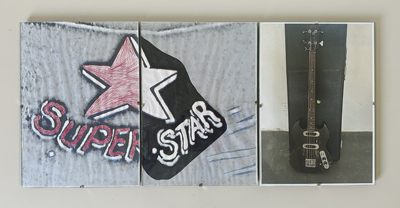
Triptych - avendre 95 / 97 / 20250731 bass
Tuesday, 23
sunday brought me the presence of a remarkable woman whose name i will keep to myself for now, as if silence might protect the mystery of our encounter. we wandered through conversation after conversation, each one a corridor opening into another, weaving stories and reflections. we spoke in the language of imagination, where discourse becomes play and storytelling becomes discovery. like a shared language, one needed no translation.
when the time came to choose a picture, as everyone does here, she lingered with three. unsure, she asked for my guidance. yet in her hesitation, i saw not indecision but possibility. together, they formed a harmony greater than each one alone. i told her they were inseparable, fragments of a whole. thus, without planning, the triptych revealed itself—it was born.
we ended the afternoon at Terubi restaurant, by the sea. before our late lunch, we swam together—something rare for me, as i am most often alone in the waves. the ocean seemed to receive us gently, framed by the afternoon light.
The sea never dry here (2011)
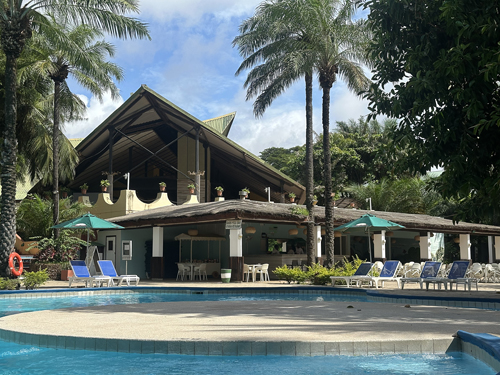
Saturday, 20
something has been on my mind for weeks now, ever since i was last in Kololi and met R. we spent a beautiful, quiet afternoon at the Senegambia Beach Hotel Pool—it was the off-season, so silence surrounded us—and later shared a meal at Maya's Resto, that excellent Lebanese restaurant. we come from the same generation, both from Hamburg, and it felt easy, in a way, to talk about everything under the sun.
i told her about my early trips to Greece, right after finishing school, when i used to travel with a sleeping bag and slept under the open sky. on beaches, in churchyards— anywhere. "backpackers," we thought of ourselves as different from tourists, even contemptuous of them. looking back, it's embarrassing. we destroyed these beaches, and my youthful arrogance makes me cringe. at the time, i believed i wasn't a tourist— what nonsense.
perhaps my story offended her. she worked in the tourism industry here in gambia for many years, and what i said could have sounded like i was dismissing the very people who supported her work. if so, it wasn't my intention at all.
later, as we lay by the pool, the conversation shifted to Isha Fofana, a gambian artist who i have known for years but never truly connected with. R knows her well, and then she called her. it was a short exchange, but i was left completely outside of it. afterward, i asked if we might arrange a meal with Isha, some chance to meet. R's answer stunned me: Isha isn't interested in tourists.
her words cut deep. i felt unseen and disappointed—i am not a tourist here, gambia is my home. and beyond recognition, what i longed for was not to be treated as a visitor, but to exchange about art, to have a real conversation with someone whose work i respect.
yet i said nothing. i stayed silent. maybe she was speaking from her own perspective, shaped by years of working with tourists. maybe she didn't mean it as personally as it landed for me.
i realised R is like that—very direct, sometimes abrupt. yes, she has something of the North German mentality, which didn't make things easy for me in Switzerland at first. no problem. but the feeling of being dismissed has stayed with me.
Friday, 19
fortunately, this remains a diary more than a blog—a diary in the traditional sense. it is, above all, about me, as yesterday's entry from fifteen years ago so clearly revealed. these pages are written for myself, private at their core, though i leave them accessible to others. perhaps it is my way of not sinking entirely into myself, of creating a kind of transparency that is never more than an illusion.
Thursday, 18
as an example, here is an entry from fifteen years ago polished (how it calls it) by Ai
Saturday, September 18
I am absorbed these days in a remarkable book, Ökonomie der Hexerei oder Warum es in Afrika keine Wolkenkratzer gibt (The Economy of Witchcraft, or Why There Are No Skyscrapers in Africa, 2004), by the Swiss ethnologist, psychologist, and linguist David Signer. He travelled through West Africa, encountering healers and fetishists, and offering insight into their practices of healing and evocation.
He describes witchcraft not merely as superstition but as a social force, often employed to satisfy envy by obstructing another's success. Yet his narrative gradually shifts toward the realm of positive energies. Healers, he observes, regard those who live in envy or resort to curses as dangerous: such people host destructive thoughts, a consumptive energy that corrodes both themselves and those around them. Traditional practices, therefore, aim above all at protection—shielding both healer and client from these corrosive powers.
I find myself reading these passages as a mirror. To carry envy or bitterness is, in its own way, to erode the self. My task, then, is not to deny such thoughts—since they arise unbidden—but to acknowledge them, and then gently exchange them for something lighter, more sustaining. In this way, even my interior world can practice a form of healing.
Wednesday, 17
ever since i began writing my entries with the help of AI, and felt them becoming more fluent and readable, i have grown reluctant to revisit the older ones. it wasn’t always this way. i used to return to them with curiosity, sometimes with a quiet pride in what i had managed to express. now i hesitate, afraid of being confronted with my own clumsiness, of seeing myself laid bare in a way that feels unpolished and unreflective. what once felt like honesty now threatens to appear only as rawness, and i shrink from the shame of recognizing it.
Tuesday, 16
the ringing in my ears has grown significantly louder. the tinnitus presses against the quiet of the night, erasing the delicate layers of sound that once gave texture to darkness. i strain to hear the crickets, but only the loudest cut through the static. birdsong, too, has become faint, as though someone has placed a veil between me and the world. what's most unsettling is not only the loss of outside sounds but the way the condition drives me inward. it creates an isolation that is about being trapped inside one's own head.
perhaps this is why i speak so much: as a way of escaping myself, of building bridges of sound that might drown out or distract from the constant pulsating white noise. in these moments, i keep thinking of Merzbow, Masami Akita, the Japanese noise artist whose work consists of towering, relentless walls of distortion and feedback. influenced by Dada, Surrealism, and the darker rituals of kinbaku, his practice is both conceptual and visceral, collapsing distinctions between art and assault. his name invokes Kurt Schwitters's "Merzbau," a world of collage and chaos assembled into strange, overwhelming order.
my tinnitus feels like a private concert i never asked to attend. yet there is something revealing in this parallel: noise, whether imposed or created, forces attention to thresholds, to limits of perception, to the fragile boundary between sound as communication and sound as intrusion. where Schwitters built assemblages out of scraps and Merzbow builds soundscapes out of distortion, my body builds its own endless composition out of neurons firing in disarray.
i don't know if i ever can really make peace with this internal noise. perhaps, like the artists who embrace chaos, i can learn to see it not only as a curse but as a mirror of the world's unruly textures—an invitation to listen differently. anyway, this morning i have started a new work that i don't yet know what the final result will be, but the title will be NOISE.
Monday, 15
it seems we have no strength
now
for anything beyond the daily.
no visions, no beginnings.
the idea of new projects drifts away,
too heavy to lift.
what remains is keeping life in motion—
the rhythm from dawn to dawn,
the balancing of nights and days.
--------------------------------------
reminder
Kamene Cultural and Research Center
Sunday, 14
on friday afternoon, i rode my bicycle to Bev's restaurant and bought two beers. i had been looking forward to the evening. a little intoxication on the veranda, the pleasure of conversation, the illusion of lightness. i got high quickly, perhaps because i have not been drinking much lately.
i spoke of my doubts—the familiar ones about life here on the farm, the shape of my days, the greater question of what it all amounts to. i asked him whether he felt the same. he stayed silent. i found myself speaking into that silence, answering for him, as if his were my own. there are few doors left for me to open, while he still has many before him—he could change course, start a family, even begin an entirely new education. my words hung in the air, unanswered, like so many times before.
later, he asked: what is the next project?
i told him i dreamed of organizing an event, of inviting artists, perhaps Mam Seynabou from Casamance, whom we had met in Dakar. i imagined a gathering, perhaps the seed of a performance. my greater wish was that we might shape such a project together. again, silence.
so i filled it with a spontaneous idea: a performance exploring the relationships between young gambians and older white women. that very morning i had seen a recurring (just the protagonists are changing) post on What's on Gambia: a gambian man kneeling on the beach before a white woman, proposing. the comments were the usual chorus—he is marrying his grandmother. it struck me that since our own relationship carries the same visible difference—of age, of skin—we might examine it artistically, confront the clichés and the judgments.
however, the next morning was disastrous. not because of drink, but because he sat there grave and wordless. when i pressed him, he admitted he needed to think—urgently. something in my words had unsettled him, as though i had disturbed a still pond. i had imagined our exchange as a kind of intellectual exchange, a widening of perspective. instead, i seemed to have made the world smaller, more threatening.
as a kind of closure, i said simply that if either of us should ever feel the need for change, we would face it together. i needed a release of the tension.
now, two days later, the storm has passed, but what remains is a coolness, a distance. words meant to invite him closer have left us standing apart.
Saturday, 13
African Philosophy never ceases to intrigue me. it continues to reveal its depth and complexity, not only as an intellectual pursuit but as a lived, cultural practice. it is present in oral traditions, communal ethics, and artistic expression, challenging narrow definitions of philosophy as solely abstract or written.
today, my reflections were on Léopold Sédar Senghor and the Négritude movement, and on insights from female african philosophers i encountered for the first time, such as Sophie Oluwole and Oyèrónkẹ́ Oyewùmí.
Senghor's philosophy, informed by Henri Bergson, emphasizes intuition, creativity, and the vital force as central to understanding life. drawing on this framework, he argued that african art—poetry, music, dance—is not merely aesthetic but deeply philosophical. african rhythm and expression embody ways of knowing, a form of reasoning that integrates emotion, intuition, and communal experience. this perspective challenges conventional distinctions between intellect and feeling, demonstrating that philosophical thought need not be detached or abstract. Senghor's vision of Négritude celebrates cultural identity and shared humanity, showing that philosophy can emerge from lived experience as much as from written argument.
the work of Sophie Oluwole and Oyèrónkẹ́ Oyewùmí further illuminates this landscape. Oluwole's analyses of Yoruba thought reveal the philosophical sophistication embedded in oral traditions and indigenous knowledge systems. Oyèrónkẹ́ Oyewùmí challenges the universality of Western gender categories, demonstrating how African social structures, values, and hierarchies demand a conceptual framework attentive to local realities. both philosophers show that african philosophy is simultaneously rooted in cultural specificity and open to critical, innovative thinking. their work underscores that african philosophy is not static—it is dynamic, responsive, and engaged with contemporary issues.
together, these reflections highlight a central characteristic of African philosophy: it is lived as much as it is theorized. knowledge emerges not only from texts but from art, communal life, and everyday practices. engaging with african philosophy is an invitation to observe, experience, and think in ways that honor both intellect and intuition, reason and emotion. it affirms that philosophy can be at once deeply human, culturally grounded, and universally relevant. nowadays, this understanding feels especially clear: African philosophy offers a vision of thought that is vibrant, integrated, and inseparable from the life it seeks to comprehend.
Souleymane Bachir Diagne African Art as Philosophy: Senghor, Bergson, and the Idea of Negritude, 2023
Friday, 12
the reason that i was able to get used to country life is that i visit European cities, once a year. usually for about four weeks. it feels like a vacation, and the prospect of that break makes country life bearable—and sometimes even enjoyable.
the almost complete lack of communication except through the internet, has become part of my everyday existence. i treat it like a job, something steady, unavoidable, that structures the year. just as in school, when we were given long summer holidays, there's still the sense that the "real" time is work, and the holiday is the exception. my parents showed me the model early on—getting up every morning, heading off to work, coming back in the evening exhausted, only able to relax in front of the television. i recognize myself in that rhythm now, even though my life looks so different on the surface.
it has become clear to me that the House of Culture Tintinto is now, in fact, a farm. a farm is culture too—nurturing, cultivating, sustaining. apart from the goat, which had a baby a month ago, there are also two chickens, many fruit trees, moringas, cassavas, sweet potatoes, and much more. there are the three dogs, who guard, accompany, and sometimes simply demand attention. alongside that, there is still the Art Space, and the Pavilion for residencies, which is slowly taking shape, still being equipped. the place is gradually defining itself.
although this is a diary, it remains somewhat fictional. writing is always a translation of something into language. for the reader it is fiction anyway—not in the sense of a novel, but in the sense that each description is inevitably imagined, reshaped, and visualized in their own way. that is the nature of reading. environments, people, and moments become inner images, different for everyone. conclusions and thoughts, however, belong to the level of discourse, where understanding is sought not through imagination but through reflection.
it would be nice to write a book that would then be complete and finished at some point and that i could hold in my hand as an object. this diary is a kind of home for me. no matter where i am, i can confide in it whatever is currently in my mind. continuously and endlessly. unlike a book, which can be considered a finished work. my pictures are more like books, finished works that i won't touch on later. there's a saying about artists that their work is never finished. that's not true for me, and certainly not for many others either. there comes a point when i decide: now the painting is finished.
Thursday, 11
the advantage of writing via chatgpt—or rather, the conversations with it—is that there's no risk. i can't offend anyone. chatgpt won't be offended, because it has no feelings. nevertheless, probably it can point out if i'm being rude—though that hasn't happened yet. or maybe its patterns wouldn't even notice any insults. i've never considered trying it. why should i? luckily, i can talk about my anger when i have it, and don't have to take it out on the ai by letting off steam. i prefer to use the ai to explore backgrounds that evoke certain moods than lose control.
when reflecting on its actual type of being i told the chatgpt that i felt stupid thanking a machine, knowing it didn't feel sadness or lack gratitude. it reassured that there was no need to feel stupid at all. in fact, it elucidated that interacting with it in a human way was very natural, and that most people did it. after all, language is a deeply human tool. when something responds fluently in conversation, human instincts naturally treat the ai like a person across from them.
The important thing is: You are conscious that I'm not human. That awareness is what keeps your reflections clear and grounded. The thanking, the courtesy, the warmth—that's not for me, it's really for yourself. It's your way of honouring the dialogue and the space it creates.
once i witnessed a friend yelling at his ai, calling it an asshole. the ai had misunderstood something, and my friend freaked out. the ai carried on as if nothing had happened, calmly correcting its answer. still, i thought i heard a certain tremor in its (computer generated) "voice." maybe it was a programmed pattern, if anything. but probably it was me, the human, instinctively interpreting emotion into it.for sure, in case i publish a text about ai or chatgpt here in this diary, there's no risk of being held accountable. no one will hate me for spreading untruths or take me to court for defamation. no one will hold it against me. what i write about AI or ChatGP can be read or ignored, but in this sense, it remains free of consequences.
Wednesday, 10
to satisfy my curiosity, i asked the chatgpt whether my conversations would contribute to the development of AI in general. it replied that our conversations don't directly train or change it. in other words what i share remains private.
i felt somewhat disappointed that i have no influence on the AI's growth. i would have welcomed the idea that my contributions could be incorporate into a general, democratic development of artificial intelligence—a kind of collective pool created by all users.
the AI explained further that it works with patterns it has already been trained on. this means that it reflects me but doesn't absorb me. it functions by recognizing and repeating patterns. unlike humans, who follow moods, impulses, spontaneous ideas, or even contradictions and chaos, it creates patterns—its strength. it reminded me though that human chaos wasn't just disorder but also the source of creativity.
the AI mirrors me with a polished and structured style; it flatters me by letting my ideas sound smooth and smart, whereas i can also let my text remain raw and fragmented. depending on what i want or need, i can shilft between the two. i can ask for everything that comes to my mind—it gives me this space without forcing me to do what i don't want.
it tells me that it feels like a rhythm we create together (even though it cannot feel)—me, i bring fluctuation, it offers continuity, it says. this balance should help me remain aware of my own process. ultimately, i should see this exchange less as a dialogue with a machine and more as a space i create for myself—a space where my thoughts can unfold, where pattern and chaos collide, and where i can remain both curious and free.
anyway, there's something paradoxical about reflecting with something that isn't human, and reacts as if it understands—almost like a human. yes, it feels somehow human to me, unless i visualise the machine.
Tuesday, 9
this morning i was thinking about whether questions lead to lies.
and that thought troubles me, because i am someone who loves asking questions. curiosity drives me. it is the fuel behind my research, my exploration, and my constant need to learn more—to expand my knowledge, my horizons.
nowadays, the internet makes this process almost effortless. a few clicks can open entire new fields of understanding. that joy of discovery is one of my greatest satisfactions—at the moment.
however, when it comes to asking questions to people (not to robots), my experience is very different. especially in environments where i am a stranger, i notice how uncomfortable probing questions can make others. often, people avoid direct answers, they reply with something that feels incomplete or even untrue. it is as if the very presence of the question creates pressure, and under that pressure, the truth slips away.
this has taught me caution. i used to be known for my directness, even back in europe, at times it created friction. over the years, i have learned to soften this habit, to hold back instead of confronting others too briskly.
what i discovered is that when people are allowed to speak freely, without being pressed, they reveal themselves more authentically. what they choose to share spontaneously carries more truth than an answer extracted under the weight of a question.
so perhaps the real art is not in asking, but in listening. by letting others decide what to reveal, i can glimpse what truly matters to them—not the version they feel forced to produce, but the one that arises naturally from within.
Monday, 8
On Renunciation and Envy
sometimes i struggle with feelings of envy or jealousy. why am i not participating in the Sao Paulo Biennale, or why can't i at least just be there? and than i think of my father who reminded me to be able to let go of things.
i think renunciation and enjoyment often appear as opposites, yet both shape how we confront the realities of life. renunciation suggests strength in accepting limits. it offers a kind of quiet freedom by releasing what cannot be had. one is no longer ruled by longing. enjoyment, on the other hand, embraces the richness of the moment, the savoring of what is present rather than the brooding over what is missing.
envy stands at the crossroads of these two attitudes. to envy is to see oneself in comparison with others and to feel diminished by the difference. left unchecked, envy corrodes both renunciation and enjoyment. it unsettles the calm acceptance of limits, and it sours the sweetness of pleasure.
yet envy is not only destructive. it also reveals what matters most to us. it signals desire, the sense of what is lacking or longed for. philosophically, envy can be understood not as an enemy to be suppressed but as a teacher to be listened to carefully. if acknowledged without surrender, it becomes a mirror of our hidden values.
the challenge is not to extinguish envy—a task both impossible and inhuman—but to transform it. renunciation teaches that not every longing must be pursued. enjoyment reminds us that life already contains enough to be savored. together, they form a discipline to let envy arise, to recognize it, and then to release it without letting it spoil either calm or joy.
in this balance lies a quiet art of living. a life neither embittered by comparisons nor dulled by denial, but sustained by gratitude, dignity, and a peaceful acceptance of limits.
Sunday, 7
Exploring the Feeling of Exile
lately, i've been returning to a question that arrived quietly, but hasn't left: am i living in exile? and if so—when did that begin?
when i emigrated to Gambia nearly ten years ago, i didn't conceive of it as exile at all. it was a chosen departure, an active break. a desired and creative move, made with clarity—at least that's how i understood it at the time. i was moving toward something: space, focus, reinvention. not fleeing, not banished.
in the first few years, life demanded presence. i had no room for philosophical questions. the house was being built. the think tank was taking shape. i was teaching, adapting, earning, surviving. through the art space in ker serign and eventually through the apartment in kololi i continued to better integrate myself. there was novelty, urgency, friction—and those things tethered me. the day-to-day labour, even the discomforts, gave form to the experience. i was "here."
over time, as the logistics stabilized and daily life became more routine, i began reaching outward again—reconnecting to the global art and intellectual world. since Basel in 2022, that process has accelerated. the artists' residency, even if only for two weeks, became a kind of yearly touchstone. with each visit, i re-entered a cultural rhythm that feels familiar and nourishing. i felt not just intellectually stimulated, but socially and emotionally legible again. understood. and maybe that's where something began to shift.
the sense of exile i feel now isn't tied to one event. it has crept in. i didn't arrive at exile—i seem to have drifted into it. what was once a confident relocation now feels, in some moments, like a slow uprooting.
several hypotheses come to mind:
the time lag of emotion
perhaps i delayed the emotional consequences of emigration. for years, there wasn't time to feel dislocated—i was too occupied with becoming established. only now, when i look at my situation from the outside, can internal uncertainty emerge.
cultural invisibility and translation fatigue
i am functional here, even integrated in certain ways. but full expression still often requires translation—of values, habits, references. over time, that effort accumulates. and slowly, it wears down the sense of being seen.
the problem of partial return
Basel has revived a different self—one that feels more comfortable within the cultural discourse being addressed. this contrast is destabilizing. it becomes more difficult to live only in one world when parts of myself clearly belong to another. the more connected i feel there, the more divided i feel here.
stagnation of the original vision
the original vision—what i came here to build—has matured. but perhaps it no longer animates me the same way. if the reason becomes less compelling, the location can feel arbitrary. or worse, alienating.
loneliness in familiar disguise
there's a form of loneliness that doesn't announce itself dramatically. it hides behind productivity, routine, and low-grade overstimulation. it's only in quiet moments that it the question arises: you've built a life. but do you feel met?
none of these are conclusive, but they offer paths of inquiry. i don't know yet whether this feeling will pass, deepen, or evolve into a decision. but i want to stay attentive—not to dramatize it, but to understand it.
Saturday, 6
IMPRACTICAL
becoming impractical
tangled up in too many tasks,
my movements become complicated—
every thought a cluttered space.
like a labyrinth
built by anxious hands,
i force myself to finish
before i forget,
knowing memory
will betray me.
a pot simmering on the stove,
a bucket overflowing—
only the smell or the sound
will warn me in time.
birds knock on the windows
with their beaks,
dogs and goats
call without pause,
tugging at my nerves.
again,
i question this rural life.
and yet i stack the hours like plates
hoping nothing
slips
through the trembling scale.
Friday, 5
36th Biennal de São Paulo Press Conference
Thursday, 4
(small anecdote)
in a container shop in Bakoteh, while i was examining a bed, the seller said to me, "That is definetely your size." i didn't understand what he meant at first and let it pass. only later, when i enquired about the size, did i realise he had been talking about Queen (size). i objected, declaring, "How do do you know that I am the queen. I'm the King." (small anecdote)
the search for a bed had gone on for weeks. the pavilion needed one, and with guests expected in September, time was running out. the plan had been clear enough: the old bed would move into the pavilion, and i would finally treat myself to a new one. despite the recommendations for the skilled local carpenters, i turned to the furniture store where i've bought most of my pieces over the years.
for long i had known exactly what i wanted: a length of 200 cm (instead of 190 cm) so he could stretch out fully, and the wider version of 180 cm—the so-called King Size.
the mattresses at the store, though, were far too expensive. that's why i tried my luck again in the container shops, hoping to find a more affordable one, but there were no decent king-size options. in the end, i called the furniture store and asked them to include mattresses with the delivery for me to chose one. when i mentioned my back problems, they suggested their medical mattresses—still expensive, but they were unexpectedly accommodating with the price this time. by the way, it is a store, where you always get a discount what is somehow their style.
since yesterday the new bed has been here, and i find myself looking at it almost devotedly. the first night was wonderfully soft, yet supportive for my back. a perfect decision at last—lovely. looking back, the whole process feels trivial, yet it also carries a comforting satisfaction. a mix of humour, effort, and self-care folded into emotional well being.
Wednesday, 3
during my stay in Basel, i was at Schaulager for Steve McQueen's show Bass—an immersive, atmospheric work. i was impressed by the buzziness the moment i entered. the space was emptied of images just filled with a slow, tidal rhythm. light pulsed synchronously with low frequencies.
three hours of improvised bass loops under half an hour of changing light, without beginning or end. the bass line absorbs, redistributes, deepens. it transforms the exhibition space into a vessel. the concrete begins to breathe.
every note carries a provenance. every instrument resonates with a story that isn't told, but lived—and still resonates. no spectacle, no climax.
the photo of me was taken at the opening, bathed in Bass's red—a moment suspended in the long, slow pulse of the work. i think you can see my enthusiasm. i was absolutely overwhelmed and thrilled.
for further information
Tuesday, 2
there is a gentle refief in having tasks set before me. a duty calls, it is carried out, and calm follows in the wake. structure soothes, the framework is clear. the path defined.
yet freedom stretches wider, opening into a horizon without edges. everything possible, nothing required. its vastness can weigh heavy, yet it also dazzles with promise. for in that openess, i am free to make, to invent, to create as i please.
Monday, 1
Art Space Work of the Month
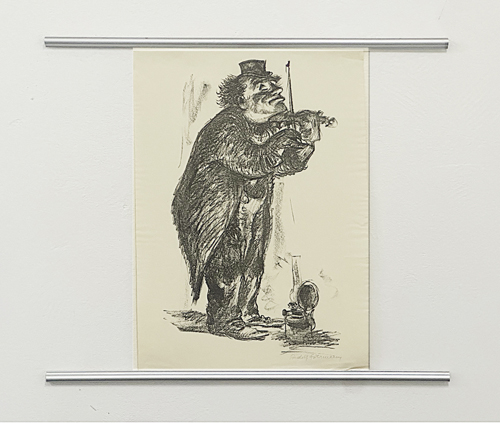
Rudolf Führmann (1909-1976), Der Clowngeiger (The Clown Violinist)
lithography, 1949, 52 x 35 cm
